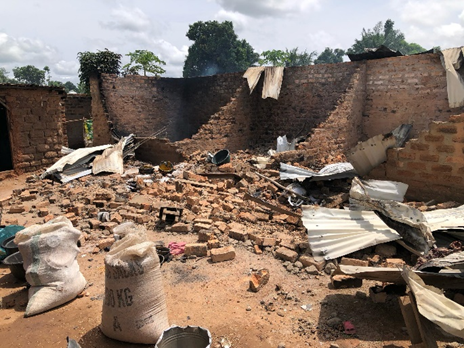Militant Fulani killed 200 internally displaced Christians in one night at a shelter in Yelewata, Benue, Nigeria, June 13. CSW photo
PLATEAU, Nigeria (BP) — Nigerian missionary and community activist Fred Williams recalls New York’s 9/11 not only because of the previously unthinkable terrorist attack. Sept. 11, 2001, was also the first time Islamic terrorists attacked his village in Plateau State, Nigeria.
“The very week that the Twin Towers were attacked in New York, we were also attacked. We had been under attack for several days,” Williams told Baptist Press. “And then we heard on the news about the plane flying into the Twin Tower. I remember we had not been able to stay indoors because the militants had come and attacked us.
“Then I heard about the attack in the States, rushed in to see it on the news. And while I was watching in horror, the second plane crashed into the Twin Towers,” he recalled Nov. 5. “So I would never forget, because that was (also) my first experience with terror (at home).”
The Nigerian government has been unsuccessful in ending the terrorist attacks that have escalated in Nigeria’s Middle Belt. Ten years ago in December 2015, then Nigerian President Muhammadu Buhari – now deceased – declared a “technical defeat” of Boko Haram. Not only did the jihadists continue their attacks but other terrorist groups have risen there, including militant Fulani, the Islamic State – West African Province (ISWAP), Jama’a Nusrat ul-Islam wa-al-Muslim (JNIM) and the newly organized Lakurawa.
“Since (2001), the attacks have been relentless, continuous,” Williams said. “And so it’s been stories of carnage and killing and horror.”
The husband, father and former Nigerian pastor with dual Nigerian and U.K. citizenship now lives in the U.K., but travels to Plateau and other Nigerian states about four times a year, staying several months at times.
Williams said he can’t judge the potential impact of a U.S. military response to Islamic terrorism in Nigeria, but he appreciates that other nations are beginning to see what Nigerian Christians suffer almost daily. Hopefully, renewed dialogue and exposure will put pressure on the Nigerian government, he said, describing leadership as either compromised, or suffering collusion or a lack of a political will to address the violence.
“I feel worse than genocide is happening in Jos, in Plateau State, in Benue State, in Southern Kaduna, and (some are) talking about it as if these are just mere statistics. No, thousands are being killed,” Williams said. “I’m constantly in those villages. I have interviews. I have photos. Most of what is happening is too graphic to show media. That is how bad it is.”
U.S. President Donald Trump threatened sanctions and military force against Nigeria when he designated a nation a Country of Particular Concern for tolerating systematic, ongoing, and egregious religious freedom violations under the International Religious Freedom Act of 1998.
Williams was in the U.S. today, bringing attention to the violence and advocating for help. His interview with Baptist Press was arranged through the religious freedom advocacy group Open Doors U.S., which in its 2025 World Watch List ranked Nigeria as seventh among the 50 states where Christians are most persecuted. More Christians were killed in Nigeria in the 2024 – 2025 study year than anywhere else, accounting for 3,100 of the 4,476 Christians killed globally that year, Open Doors said. Millions more are internally displaced.
“I just know that for too long, innocent women and children have been slaughtered and the silence of the international community has been deafening,” Williams said. “In my opinion, I think it’s about time that something be done to highlight the situation. The military perspective, I don’t know, I’m not a politician and it’s very difficult to speak on those matters, but people are dying and little is being done about it.”
The narrative of an ongoing battle between Christian farmers and Fulani herdsmen needs to be corrected, Williams said, to reflect that innocent Christians are being killed without provocation.
“There are Christian communities that have been slaughtered. There are mass graves. While President Trump was making the announcement on (Oct.) 31st, killings went on, literally,” Williams said. “While that was going on, killings were going on in response. So people in Plateau, people in Benue, people in Southern Kaduna, they have now learned to dig mass graves. And it’s now the trend.”
Despite the horrors, Nigerian Christians are persevering in faith, Williams said. He is working with other ministers to aid villagers by installing solar panels and distributing laptops, enabling them to tell their own stories of persecution and faith. Before the solar panels, villagers without electricity walked perhaps 10 miles just to charge their phones, Williams said.
He encourages Christians worldwide to pray for practical intervention to stop the killing, and to support persecuted African Christians through such projects as Arise Africa, an Open Door outreach in concert with the Association of Evangelicals in Africa. Arise Africa engages the global community in spreading awareness of the persecution and supporting Nigerian Christians spiritually, physically and emotionally.
“The scale is massive,” Williams said. “But beyond praying, you can send and you can give. It’s very important that you realize that there are whole communities right now that need our support, and we can explore creative ways to engage with them.”
Among the largest slaughters of Christians in Nigeria this year is the June slaughter of 200 Christians who were internally displaced in Nigeria and sheltered in Yelewata.
While Boko Haram targeted Christians and moderate Muslims in its early attacks, attacks in recent years by militant Fulani in the Middle Belt target Christian villages almost exclusively.
Diana Chandler is Baptist Press’ senior writer.
© 2025 Southern Baptist Convention. Site by Mere.
